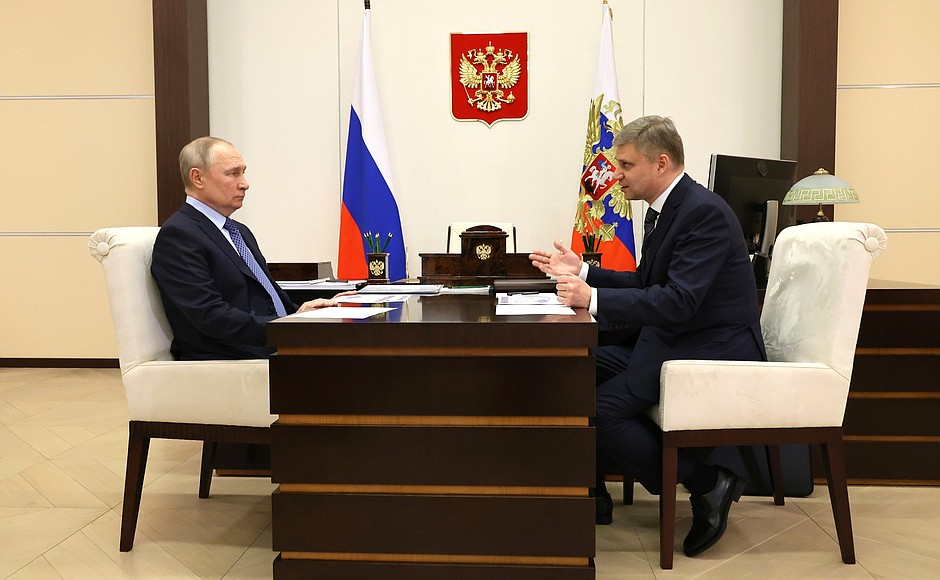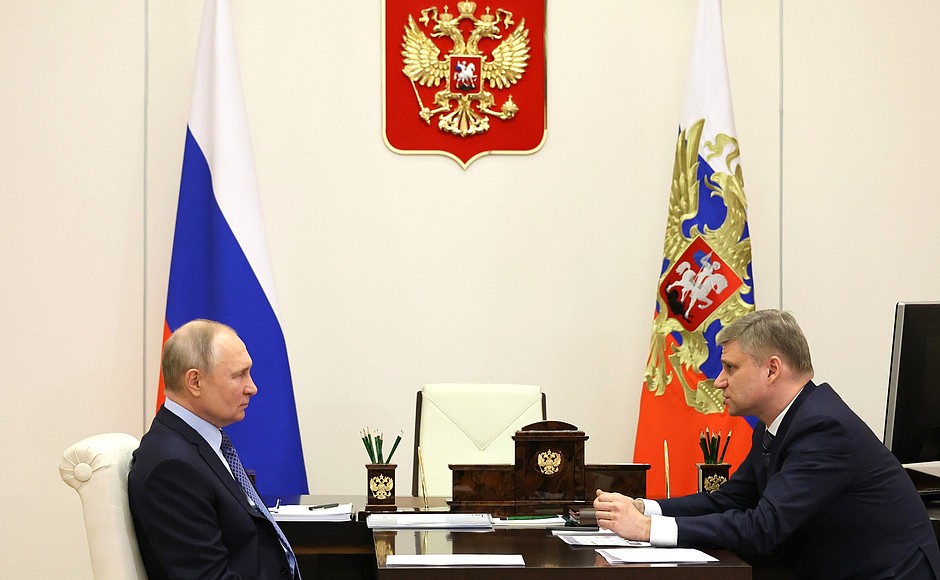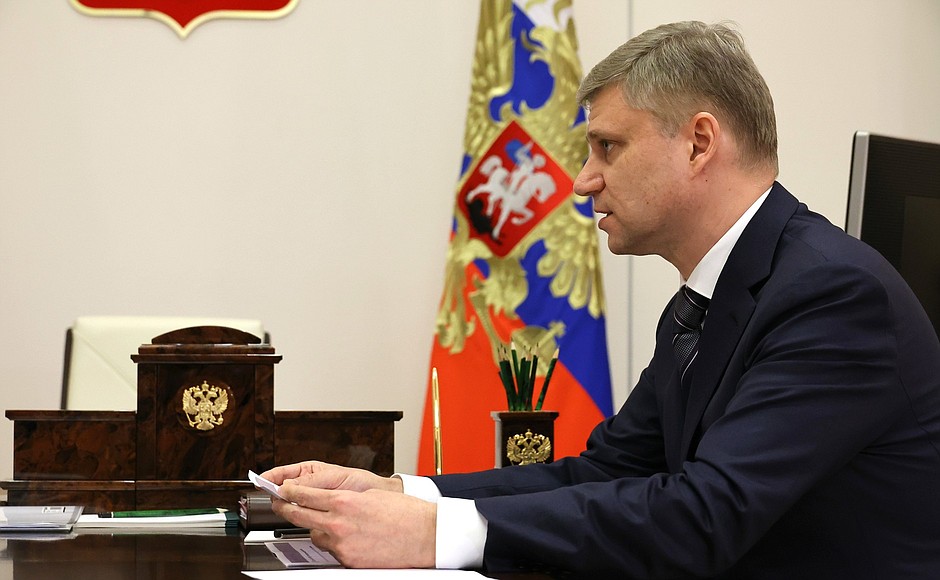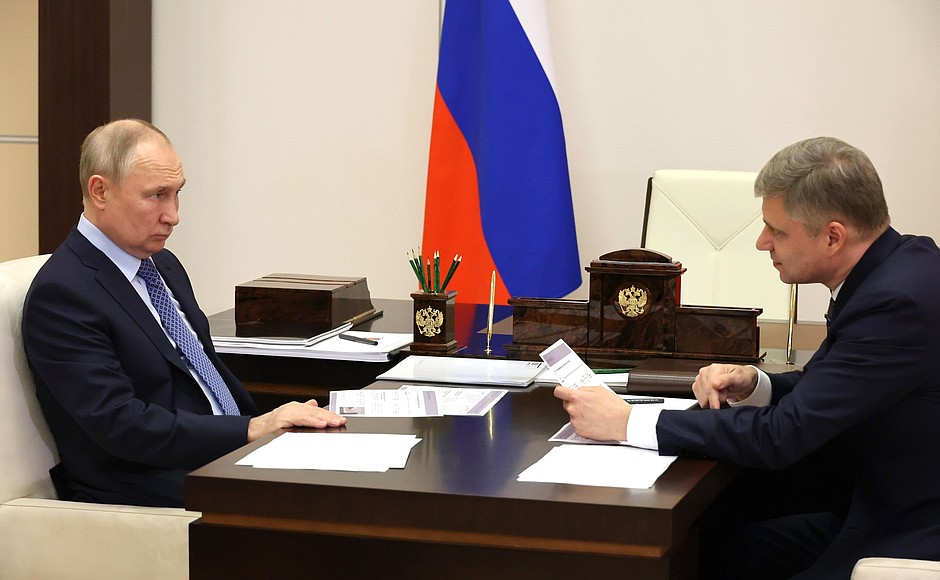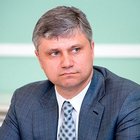President of Russia Vladimir Putin: Mr Belozerov, let us discuss last year’s performance, the usual things: passenger traffic, cargo operations, investment activity and wages.
Russian Railways CEO Oleg Belozerov: Mr President,
I would like to thank you for your constant attention to and your support for Russian Railways. I regularly report on various areas, and on the whole, here we have prepared the final figures – they are impressive, they are record-breaking, despite the circumstances of 2022. I would like to report on a number of areas.
Firstly, Russian Railways will celebrate a special anniversary in 2023: it will mark 20 years since the Ministry of Railways was transformed into Russian Railways JSC. We, as a team, intend to celebrate this anniversary with records: 2022 shows that this is possible.
First of all, a unique aspect of last year’s work is the headquarters mode. Together with the Government, First Deputy Prime Minister Andrei Belousov, and the Ministry of Transport, we worked to solve problems almost daily, since the situation was such that new input data were received every day. We have achieved all the targets set by the Government, and we have been addressing additional operational issues: those that you set for us among other things.
2022 saw the highest volume of so-called equated work. You said: cargo and passenger traffic. If you add them up – and this is the main figure for railways, showing the efficiency of our work (this is the equated work) – you will see an absolute record. Historically, we can compare it with 1988, when there was a record in Russia; it was exceeded by almost 25 percent. At the same time, 2021 was exceeded by 0.8 percent. Maybe it is a small number, but given the volatility of 2022, it is very important.
We are the world leader, we rank first in terms of security, I report to you, as per tradition. Our figures – the number of accidents per cargo transported – are almost two times better than the global average.
We have improved our position in Russia as well, and freight turnover has slightly increased in relation to other modes of transportation: 87 percent of freight turnover is Russian railways. And passenger traffic has grown by a little more than four percent: here we have the restrictions that were introduced for aviation, but, in any case, we tried to mitigate these restrictions as much as possible.
We traditionally provide sustainability and quality. At the same time, every year we choose an area. In December 2021, we designated 2022 the Year of Corporate Volunteering. We wanted to hold about 600 events, developed a plan, but as a result, we had almost 1,700 events. Our employees participate in almost all events that take place in Russia.
Of course, the very first actions, difficult ones, were helping refugees, when our employees provided transport for people; they were the first to start this work: over 60,000 people, almost 20,000 children. We act together with the All-Russian People’s Front, collect humanitarian cargo and send it to the territories together.
At the same time, the greatest value in Russian Railways is traditionally the Russian Railways team. Our collective agreement ended last year, it runs for three years, and from 2020 to 2022, not a single dispute under the collective agreement was recorded. We signed a new one for 2023–2025, retained the best and added support for motherhood, childhood, a healthy lifestyle, volunteering, and pensioners.
At the same time, real wages grew by one percent last year. And in spite of everything, we are monitoring our effectiveness very closely. Last year, our labour productivity increased by almost three percent, to 102.8 percent.
Vladimir Putin: Great. And which categories of workers’ wages have increased above average?
Oleg Belozerov: Traditionally, our main contingent is drivers. They did really well last year. Moreover, it is already forgotten, but at the beginning of the year, we had covid, and in a number of cases we had to send people on business trips in order to support work teams. A huge number of people were forced to travel this way. Of course, this is all paid for under the collective agreement. We are very grateful to the drivers that they coped with the task that was set by you and the economy.
Probably, our main achievement is passenger volumes. Normal operations basically returned in 2022. We did not waste any time in preparing for higher passenger traffic on long-distance routes. Almost 74 percent of all tickets were sold online last year compared to 57 percent in 2019. That is, we have seen an almost a 30-percent increase.
What is also interesting is that now you practically do not need a ticket to board the train; you can show your passport and then just board. At the same time, we have worked closely with the Government to combine information systems, and now federal benefit holders do not have to collect a large number of documents – all this is immediately provided when selling a ticket.
Now we have more high-speed trains, and bi-level trains have proven their value very well: we have increased their use by almost 30 percent – more than 60 cities. A very good result.
At the same time, I would also like to draw your attention to the fact that we have a project entitled, We do not Abandon Our People, we are involved in tourism. We agreed with the Ministry of Defence that any service personnel who have been wounded, who have undergone rehabilitation, and their families, can use this service for free and travel in the hotel-train format.
At the same time, the number of passengers has increased significantly, with an almost 18-percent increase in long-distance routes and a 7 percent increase in short-distance routes. In total, about 1.13 billion people have used Russian Railways. Last year, we almost recovered – we are still down by 5 percent, but already this year we are exceeding this figure.
Every year we put new cars into operation. Last year a new bistro car began service – there is a restaurant car, and this is a bistro car, where the best fast-food practices and technologies are used.
Freight transport was a very difficult topic last year, almost individual logistics. We are a planned company, but last year we had to restructure many processes since a huge number of companies – more than 700 companies – reoriented their business from the West to the East, which made it possible to maintain production and jobs.
At the same time, our freight rate index remained at the record level of 2021, that is, it did not drop, and we set another record for container traffic. You gave us instructions for the East, and we have been fulfilling them; the first half of the year was problematic, but in the second half, we did our best and reached record numbers.
Mr President, we regularly speak of the economy turning to the East; we have seen figures for the second half of the year, and in fact, for the first time in the history of our railway traffic, freight volumes to the East exceeded volumes to the West: 80 million to the East, 76 million tonnes to the West; this was the trend in the second half of the year.
At the same time, there is another interesting comparison: freight shipping to friendly countries increased by 23 percent, while with unfriendly countries it dropped by almost 40 percent, from 365 to 210 million tonnes, and this trend is continuing. That is, we see that those who do not want to work with us are losing a lot.
We see good results in the integration of economies within the Union State. It is sometimes said that carloadings have slowed a little, but the cargo trade is growing. For us, loading in Belarus is not reflected in our reporting, but transportation, in kilometres, is. Accordingly, we made the transiting process easier, which provides more work for both Belarusian Railway workers and us.
Investment activities. Mr President, I would like to thank you for supporting the Russian Government’s proposals. There has never been this kind of support: 467 billion rubles in two directions.
First, 250 billion rubles from the National Welfare Fund will support our investment programme, which is primarily the purchase of passenger cars, part of the Eastern expansion, and 217 billion made it possible to reduce our debt on loans. At the same time, the volume of investment is 883 billion. This has never happened before, plus 25 percent against 2021.
It was difficult for the Eastern operating domain, as we reported, but we have almost doubled the construction programme and not only reached, but surpassed, the construction programme objectives for the Eastern domain. All of our targets have been met. The eastern routes: 158 million tonnes, the northwest – 145 million, and the Azov-Black Sea basin – 125 million. At the same time, we are reporting on the central transport hub together with [Moscow Mayor] Sergei Sobyanin: we will reach all the indicators as planned, in exactly the same way.
Last year, under your instructions, we developed a long-term programme to update infrastructure by 2035. The Government approved it, and we completed all the repairs for last year, including at the Eastern operating domain – 1,300 kilometres were repaired or upgraded.
Vladimir Putin: Did you spend 138 billion rubles at the Eastern Operating domain?
Oleg Belozyorov: Yes.
Vladimir Putin: Quite a large amount.
Oleg Belozyorov: Before that, we spent 78 billion.
At the same time, we are moving in all directions, as you instructed, we adhere to the position that now is the time for opportunity: not just construction, but we need to move forward in all directions, including technology. First, the Eastern operating domain is about new technology, because without this it is impossible to implement the needed innovations.
For example, we have doubled heavy freight traffic, trains weighing up to 7,100 tonnes. Container trains have been connected, that is, two trains run together on the same line on the schedule, this is almost a 1.5-time increase. And a unique technical operation – we started connecting heavy freight trains, with a single train weighing up to 14,200 tonnes; the length of these trains can be more than two kilometres. Such is the technology.
We are developing quantum communications; we are fulfilling your instructions in full and on time. This year we will complete another 1,400 kilometres; we rank second in the world with 1,150 kilometres. On your instruction, we are working with science and with universities to lay out quantum networks both internally and connecting to the backbone network. We will finalise this programme and will implement it.
At the same time, another very good indicator. We traditionally research – about 200,000 traditional items – what we use in railway operations: infrastructure, control systems, including locomotives. At the beginning of last year, we had only about 7 percent of components that contained imported parts. This figure decreased to 3 percent by the end of the year. Some 110 new enterprises are now working with us, and I can say that we have restructured our work: we set a goal, these analysts come, study and very quickly give results – and these results are no worse than the foreign ones. Moreover, in a number of cases, our colleagues offer new solutions that allow us to move forward even more actively.
We are also moving forward on software, domestically designed, Russian software. Together with Rosatom and Gazpromneft, we are creating a national platform for building a resource management system for large enterprises, the so-called ERP [enterprise resource planning] system. We signed an agreement, we are the parent company in agreement with the Government of the Russian Federation, and we are on schedule. Everything will be transferred to our domestic platform.
Mr President, as I have said, we plan to celebrate 2023 with new records and even more investment programmes. We will clearly implement the programme for the Eastern operating domain: 250 billion rubles, that is, we know how we will do it. We will renew the rolling stock, and complete a number of directions through the Central Transport Hub. And another very important area: we will initiate new traffic through the Murmansk transport hub: the new Port of Lavna.
Vladimir Putin: This is on the other side, isn’t it?
Oleg Belozerov: Yes, we are planning to launch this traffic in December. We will finish next year.
Vladimir Putin: This is very important.
Oleg Belozerov: Thank you very much for supporting this project, we will implement it.
In January, at the beginning of this year, the indicators are good, and this gives us optimism.
Mr President, I want to assure you that all the goals that you have set for us will be met by the staff of Russian Railways.
Vladimir Putin: Mr Belozerov, of course, we are talking about the Eastern operating domain, but at the end you mentioned the Murmansk transport hub: a lot of issues are being resolved there, because it basically gives us access to the ocean, among other things; reloading onto ships, and solutions to environmental issues are also very important for the city.
Oleg Belozerov: They are.
Vladimir Putin: And this two-kilometre-long train, how much does it weigh?
Oleg Belozerov: 14,200 tonnes: 7,100 and 7,100. The locomotives are specially equipped, and the trains are scheduled to pass stations without stopping. That is, we usually have trains, standing at stations of a regular length. Here, when it is used, it immediately saves us a schedule line. All we do is save on schedule lines, because the most expensive thing is infrastructure, and you need one train to be either as heavy as possible or as fast as possible. We have implemented this unique technology.
Vladimir Putin: Won’t it break in winter in our northern latitudes?
Oleg Belozerov: You are asking the most important question. At the beginning of this year, we saw temperatures below minus 50. When it is below minus 35, we have load restrictions to keep the weight down, and respectively, we assemble lighter trains so that the iron does not crumble. But we have experience with these matters, that is, it is a little lighter when it is completely cold, and when the temperature becomes acceptable, we are ready to load to the maximum.
Vladimir Putin: And the fact that you are working on quantum technologies is very important. Thank you, this is very important not only for transport, for the railway system, but for the country as a whole, for the entire economy.
Oleg Belozerov: Thank you very much.
